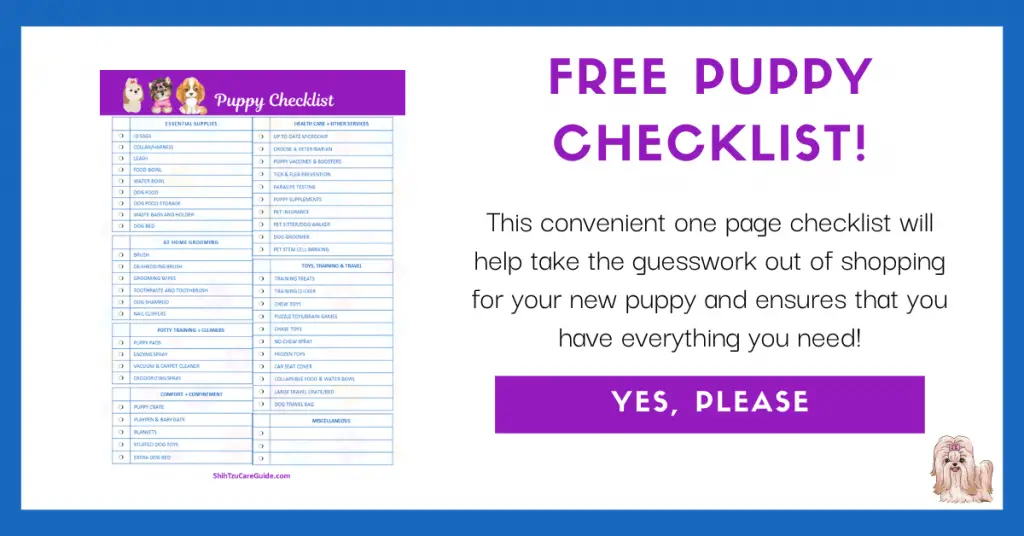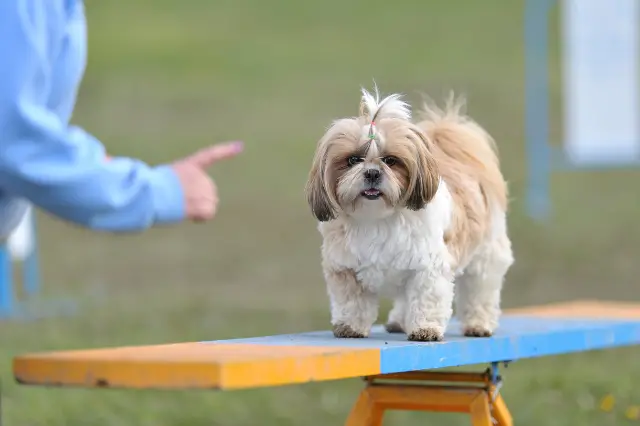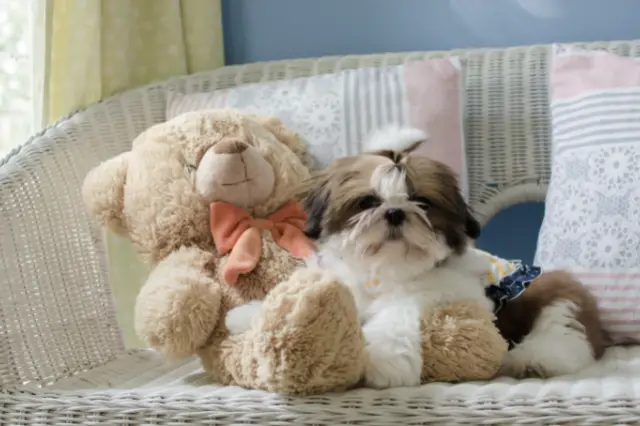It’s finally happened – you’ve brought home your new Shih Tzu puppy! This is an exciting time, but it can also be a little nerve-wracking.
There are a lot of things to think about in the first few days with a new puppy, and we want to help make the transition as smooth as possible.
Let’s take a look at 10 tips for the first day bringing your new Shih Tzu puppy home!
1. Get Everything Ready Before You Pick Up Your Puppy
You’ll want to make sure you have all the top puppy essentials ready before you bring your new puppy home. This includes food, bowls, a bed, toys, and anything else you might need.
You should also do some research on puppy-proofing your home and make sure any potential hazards are out of reach.
If possible, it’s best to take a day off work or have someone else be home with you for the first few days. This will help you bond with your new puppy and get them settled into their new home.
If you have other pets, introduce them slowly and under supervision. Some dogs may not get along right away, so it’s important to be cautious at first.

2. Create a Safe Space for Your Puppy
You’ll want to create a safe space for your new puppy where they can sleep, eat, and play.
This might be in a crate, play pen or a specific room in your house. Fill the space with their bed, toys, food and water bowls, and anything else they might need.
If you’re using a crate, make sure it’s the right size for your puppy. They should be able to stand up and turn around comfortably, but it shouldn’t be too large.
You can get a divider to make the crate smaller at first and then remove it as they grow.
Puppies like to chew, so you’ll also want to have plenty of chew toys available. This will help redirect their chewing instinct away from your furniture or belongings.
If you’re not using a crate, make sure the space is puppy-proofed so they can’t get into any hazards.
3. Choose a Potty Area
One of the first things you’ll need to do is choose a potty area for your puppy. It’s best to start with something small, like a balcony or porch if safety allows. If you live in an apartment, you can use a bathroom or laundry room.
Choose an area that’s easily accessible and where there’s not too much foot traffic.
Take your puppy to the potty area frequently, especially after they eat or drink. If they go, be sure to give them lots of praise!
Eventually, you’ll be able to start training them to use a specific spot in your yard. Until then, just keep an eye on them so they don’t have to many accidents in the house.
4. Be Consistent with Rules and Training
It’s important to be consistent with rules and training from the very first day. If you want your puppy to sleep in their crate at night, start doing it from day one.
The same goes for potty training, obedience commands, and anything else you want to teach them.
You’ll also want to be consistent with how you praise or discipline your puppy. If they do something you don’t like, be sure to tell them “No” in a firm voice. But if they do something you want them to continue doing, give them lots of verbal praise and maybe even a treat.
Being consistent from the start will make training much easier in the long run.

5. Limit What Your Puppy Has Access To
In the first few days, it’s best to limit what your puppy has access to in your home. This will help them feel more comfortable and less overwhelmed.
If they have free reign of the whole house, they may get into something they’re not supposed to or have an accident.
Start by confining them to one room or one area of the house. You can gradually increase their access as they get more comfortable and adjusted.
If you have stairs, make sure they’re blocked off so your puppy can’t go up or down them. They should only be allowed to do this when you’re with them and can supervise.
Finally, keep all doors and windows closed so they can’t escape.
6. Try to Minimize Stress as Much as Possible
Puppies are already stressed enough when they first come home, so it’s important to try to minimize their stress as much as possible. This means keeping the environment calm and quiet, and not having too many people over.
If you have young children, they’ll need to be taught how to interact with the puppy gently. Pulling tails and ears is not only painful for the puppy, but it will also make them more likely to bite in self-defense.
In general, just try to keep things low-key and relaxed for the first few days.
7. Don’t Bring Them Around Dogs Outside the Home Just Yet
Even if your puppy is vaccinated, they’re not ready to socialize with other dogs just yet. Their immune system is still developing, so they’re more susceptible to diseases.
Wait until they’re at least 12 weeks old before bringing them around other dogs outside the home. Even then, make sure it’s just a few at first. You can gradually increase the number of dogs they’re around as they get older.
If you want to socialize them sooner, you can take them to puppy classes. These are usually held indoors, so there’s less risk of them getting sick.
Just be sure to ask your vet first before taking them anywhere or bringing other dogs around.

8. Always Keep Fresh Water Available
Puppies can drink a lot of water, so make sure they always have access to clean drinking water.
You can use a regular bowl, just be sure to clean it regularly and fill it with fresh water.
A good rule of thumb is one ounce of water per pound of body weight.
Puppies can also get dehydrated quickly, so it’s important to keep an eye on their water intake. Look for signs of dehydration, like excessive panting or lethargy. If you’re ever concerned, call your vet right away.
Dehydration can be serious, so it’s always better to be safe than sorry.
9. Make an Appointment with the Veterinarian
Within the first few days of bringing your puppy home, you should make an appointment with a veterinarian. They’ll need to be seen for a wellness check and to make sure they are where they should be with vaccinations.
This is also a good time to ask any questions you have about your puppy’s health or care. Your vet can give you advice on everything from nutrition to obedience training.
Don’t wait too long to make an appointment. The sooner you take them in, the better.
10. Remember to Be Patient
Bringing a new puppy home is exciting, but it’s also a lot of work. Remember to be patient and give yourself time to adjust.
It takes time to bond with your new puppy and for them to get used to their new home. So be prepared for some bumps in the road and don’t get discouraged if things don’t go perfectly.
Just take things one day at a time and enjoy this special time with your new furry friend. Soon enough, they’ll be a part of the family. Before you know it, they’ll be all grown up.
Final Thoughts
Bringing a new puppy home is an exciting but daunting task. By following these tips, you can make the first day (and the first few weeks) go more smoothly.
Just remember to be patient, consistent and give yourself and everyone time to adjust to the new addition.
Without a doubt, your new puppy will be a loving part of the family.


